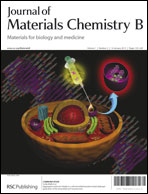Multifunctional P(PEGMA)–REDV conjugated titanium surfaces for improved endothelial cell selectivity and hemocompatibility
Abstract
Pre-vascularization of scaffolds using endothelial cells (ECs) and preservation of hemocompatibility are effective strategies to improve the long-term viability of tissue engineered constructs. The current work reports a multifunctional titanium (Ti) surface for simultaneous enhancement of EC selectivity while preserving hemocompatibility. This is achieved by REDV conjugation on surface-grafted PEGMA polymer brushes via surface-initiated atom transfer radical polymerization (ATRP) on a dopamine (DOPA)-modified Ti surface. Our results showed that the proliferation and attachment of human umbilical vein endothelial cells (HUVECs) were substantially improved by P(PEGMA)–REDV conjugation compared to pristine Ti surfaces, whilst no significant effects were observed for the mesenchymal stem cells (MSCs), thus confirming the selectivity of REDV for ECs. Platelets adhesion assay further revealed that the immobilization of PEGMA polymer brushes led to the amelioration of surface hemocompatibility, and this enhancement was not negated by the conjugation of REDV. The current multifunctional Ti-surface can potentially be useful in tissue engineered constructs for bone and dental applications as it allows for early and selective EC attachment and improved hemocompatibility whilst at the same time supporting MSC proliferation and growth.


 Please wait while we load your content...
Please wait while we load your content...